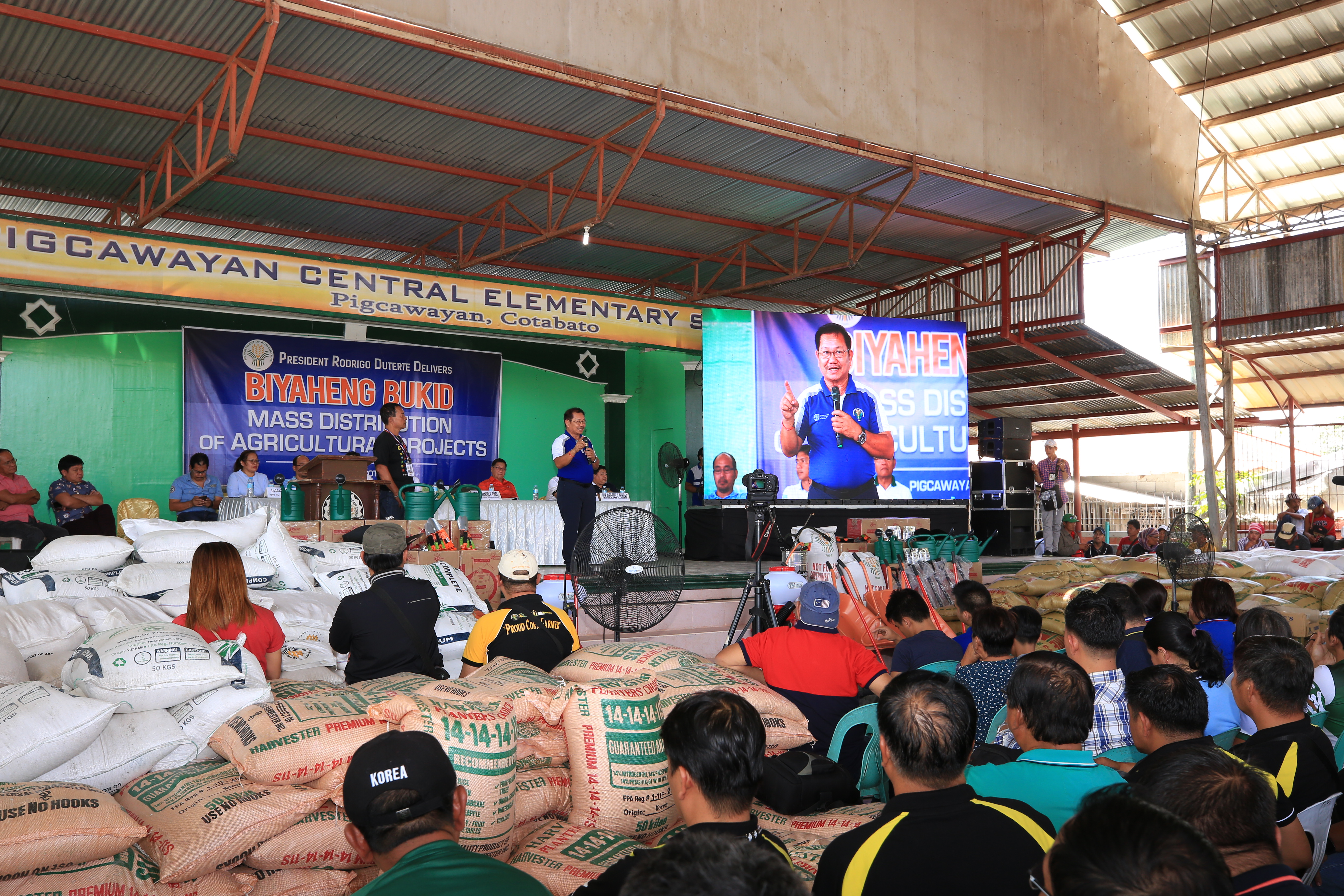
Agriculture Secretary Manny Piñol turned over P60 million worth of farm interventions and commitments to the local government of Pigcawayan, North Cotabato. This was one of the highlights of the “Tapatan: Gobyerno at Mamamayan”, a face-to-face dialogue with over 2,000 farmers, fishers, and agricultural stakeholders held in Pigcawayan Central School on February 2, 2019.
During the event, Piñol handed over two units of four-wheel drive tractors worth more than P5.25 million and directed DA-12 Regional Executive Director Milagros Casis to fast track the delivery of the additional 18 units worth P22.68 million, to be distributed to all the barangays of Pigcawayan.
As part of President Duterte’s objectives to improve the lives of the farmers and make sure that each and every Filipino has food on their table, the following interventions from the banner and special programs of DA-12 were also given to the farmers, fishers, agri stakeholders of Pigcawayan LGU: Rice Program, P35,018,496.89; Corn Program, P18,264,473; High Value Crops Program, P150,000; Organic Agriculture Program, P86,650; SAAD Program, P2,403,968; Quick Response Program, P3,759,914; Normalization, P186,750; and BFAR, P175,000. Total amount of interventions reached P60,045,251.89.
Serving the Filipino rice farmers
In his message, Piñol stressed that the Rice Tariffication is the country’s commitment to World Trade Organization.
“It was signed 20 years ago but we are now compelled to implement it,” he explained.
The Rice Tariffication will stabilize prices and supply of the staple by removing import quotas on rice and replacing it with a 35 percent tariff on imports coming from the Association of South East Asian Nations member states and 50 percent for non-ASEAN member states.
Piñol added that the rice tariffication pushed for the creation of the Rice Competitiveness Enhancement Fund (RCEF) with a P10 billion initial budget.
“Of the P10-B budget, P5-B is allocated to Philippine Center for Postharvest Development and Modernization (PhilMech) to provide farmers rice farm machineries and equipment; P3-B for the development, propagation and promotion of inbred rice seeds; P1-B for credit facilities with minimal interest rates; and another P1-B for training,” he said.
Through the RCEF, the government will provide direct assistance to rice farmers as compensation for the projected reduction or loss of farm income arising from the tariffication.
The National Food Authority (NFA) is also directed to buy rice only from the local farmers at P17 a kilo of clean and dry rice with 14% moisture content, with an incentive of P3.40 per kilo for individual farmer or P3.70 per kilo for cooperatives. He also encouraged the farmers to sell their rice even with 16% moisture content and NFA will buy it at P15 per kilo with additional incentive for individual farmer and cooperatives.
To help the rice farmers finance their agricultural inputs to boost harvest and income, Piñol encouraged them to avail of the Cash Advance Program of the NFA through the Agricultural Credit and Policy Council (ACPC). Under the new credit scheme, individual rice farmers can loan a maximum of P50,000 with three percent (3 %) interest, no collateral and payable in six months.
Piñol added that DA is maintaining a nationwide ID system to guarantee that only legitimate farmers will receive government assistance and grants.
“Gusto namin yun talagang mga totoong magsasaka at mangingisda ang aming natutulungan. Makikita din dun kung sino na ang naka-avail ng previous grants. This will be the professionalization of the farming industry of the country,” he added.
The DA Chief also encouraged the Pigcawayan farmers to avail of the farm mechanization credit loan through the ACPC. Under the program, farmers could avail of financial loan to buy tractors and other farm machineries at two percent (2%) interest payable in eight (8) years.
To address the irrigation needs of Pigcawayan and enable farmers to plant rice twice a year with an average yield of four metric tons per hectare per harvest, Piñol committed a P5.6 million worth of Solar-Powered Irrigation System (SPIS).
SPIS is a fast, efficient, and cost effective technology, which draws water from a nearby source (eg: river or creek) through a solar pump and collects it in a reservoir. Water is distributed via pipes laid throughout the entire planting field enabling even supply of water. It also allows “fertigation technology” or mixing fertilizer in the irrigation system for even distribution of fertilizer thus making farming less labor intensive.
“Our farmers deserve the best. While the government is generous, kailangan din naming makita ang pagbabago sa buhay niyo. We will be monitoring the projects that we give you. This is what governance is all about. The money (taxes) collected from the people should go back to them,” Piñol said.
Retiring happily
The agri chief also presented the Retirement Pension Fund which allows a farmer to save or deposit P10-centavo for his pension fund after 15 years or by the time he reaches 65 years old, whichever comes first.
“For example, for every 10,000 kilos of rice, a farmer has P1,000 deposit for his pension and in 15 years he gets P15,000 for his pension,” Piñol explained.
The Secretary added that government workers get pension from the Government Security Insurance System (GSIS) and the private sectors from the Social Security System (SSS).
“The farmer, just like everybody else, is a contributor to nation-building and food production therefore he deserves every benefit,” Piñol shared. (Jo Ann Grace B. Pera, DA-AFID)













